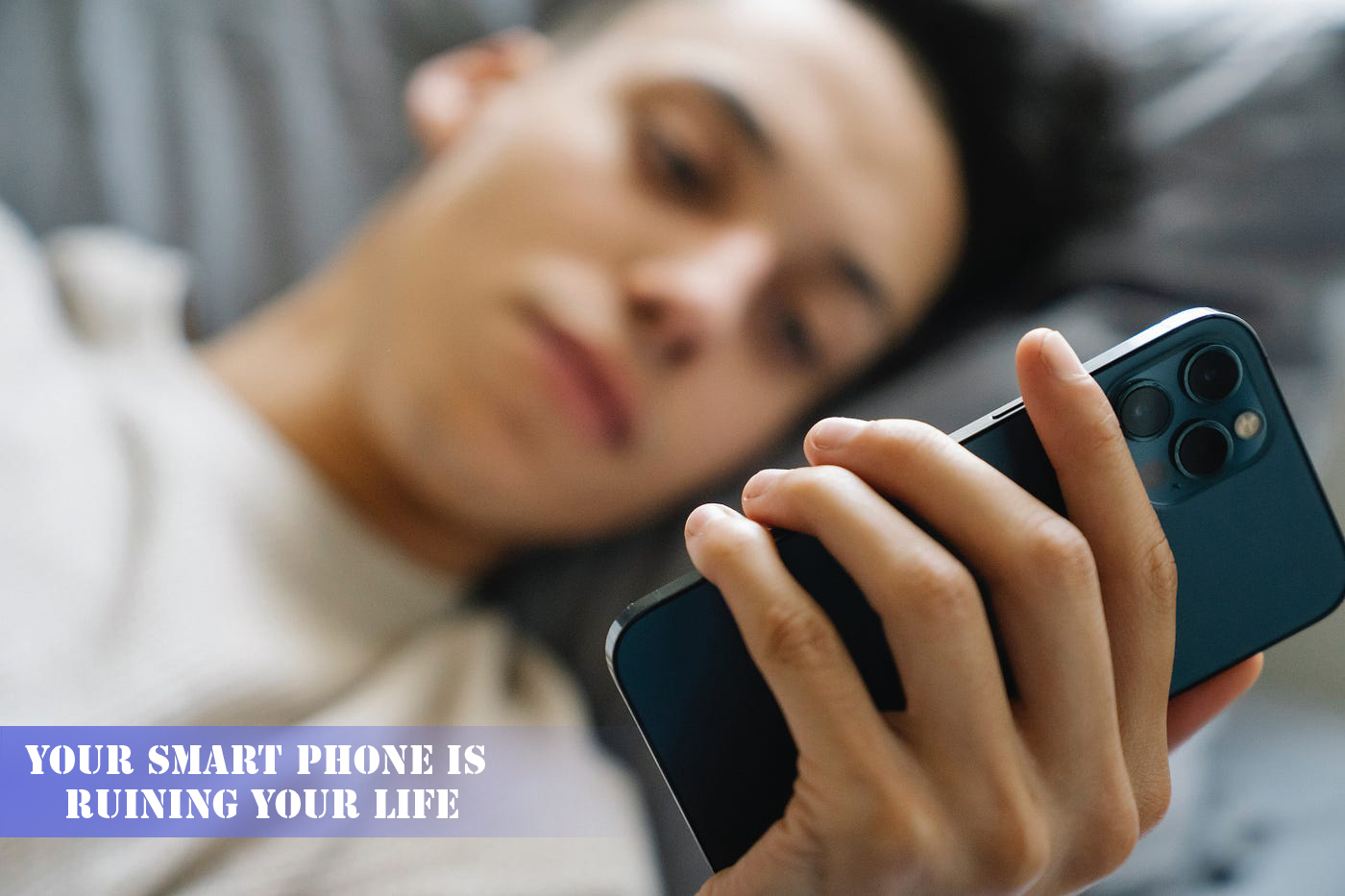In today’s digital age, smartphones have become an integral part of our lives. We rely on them for communication, information, entertainment, and even as alarm clocks. However, while these devices offer immense convenience and connectivity, they may also be sabotaging our sleep. The blue light emitted by smartphones and other electronic devices can disrupt our natural sleep patterns, leading to a range of negative health effects. In this blog, we will explore the impact of smartphones on sleep and discuss why sleeping with your phone might be a bad idea.
Blue Light Technology
Smartphones, tablets, and laptops have screens that emit bright blue light. This blue light is essential during the day as it helps us stay alert and awake. However, in the evening, when our bodies naturally prepare for sleep, exposure to blue light can interfere with the production of melatonin—a hormone that regulates our sleep-wake cycles.
In nature, blue light is most abundant in the morning, sisignallingur brains to wake up and be alert. Conversely, red light, which is emitted during sunset, signals that it is time to wind down and prepare for sleep. When we use smartphones or other blue-light-emitting devices before bed, excessive exposure to blue light delays the cues for our bodies to go to sleep. Consequently, our natural sleep-wake cycles become disrupted, making it difficult to fall asleep and stay asleep throughout the night.
Does Blue Light Affect Children?
Children’s eyes are even more sensitive to light, and the blue light from screens can delay melatonin production by up to two times as much for children compared with adults. This can lead to insomnia and poor quality of sleep, which can be particularly harmful to children.
Quality rest is crucial for children as they grow and develop. Lack of sleep in children can impact academic performance, behaviour, and mood. Poor sleep in children has also been associated with health issues, such as obesity and depression.
The Health Risks
The consequences of disrupted sleep extend far beyond feeling groggy in the morning. Continuous exposure to blue light at night, coupled with poor sleep, has been associated with various health risks. These include:
Mood problems: Lack of quality sleep due to smartphone use before bed can contribute to increased anxiety and depression symptoms. The disrupted sleep patterns interfere with the brain’s ability to regulate emotions effectively, leading to mood disturbances.
Increased risk of accidents: When we are sleep deprived, our cognitive functions become impaired. Reaction times slow down, and our ability to concentrate and make quick decisions diminishes. This can increase the risk of accidents, both on the road and in other daily activities.
Impaired memory and learning: Sleep is crucial for memory consolidation and learning. By interfering with our sleep, smartphones can hinder our ability to retain information, concentrate, and learn new skills effectively.
Heart attack: Studies have found a correlation between poor sleep and an increased risk of cardiovascular issues, including heart attacks. Disrupted sleep patterns due to smartphone use may contribute to these risks over time.
Obesity and type-2 diabetes: Lack of sleep affects the hormones that regulate appetite and metabolism. Sleep deprivation can lead to increased hunger, cravings for unhealthy foods, and impaired glucose metabolism, which may contribute to weight gain and the development of type-2 diabetes.
Various cancers: Emerging research suggests that exposure to artificial light at night, including the blue light emitted by smartphones, may disrupt the body’s natural production of melatonin and increase the risk of certain cancers, such as breast and prostate cancer.
How Can a Phone Interrupt Sleep?
The body relies on circadian rhythms to know when to initiate sleep versus when to feel awake. The circadian rhythm is a 24-hour biological process that mimics the rise and fall of the sun. A specific part of the brain called the suprachiasmatic nucleus uses external cues such as light to determine if it is time for sleep. At night, the body normally reacts to the darkness by releasing melatonin, a hormone that signals that it’s time to sleep.
However, our brains are very sensitive to light, and the blue light emitted from cell phones and other electronic devices delays melatonin production. A lack of melatonin can make it difficult to fall asleep, which can lead to insomnia and fatigue over time.
Studies also suggest that blue light can decrease the amount of time the body spends in slow-wave sleep and rapid eye movement (REM) sleep. These two sleep stages are important for consolidating memories and regulating mood.
Using smartphones before bed can have a significant impact on both the quantity and quality of sleep. The blue light emitted by smartphones delays the release of melatonin, making it harder to fall asleep. This can result in a shorter duration of sleep, as the time spent on screens cuts into valuable sleep time.
Moreover, the quality of sleep can be compromised when using smartphones before bed. The mental stimulation from activities like social media browsing, intense discussions, or engaging with news articles can activate the brain and make it harder to unwind and relax. This can prevent the brain from transitioning into a state of sleep readiness, leading to shallow and fragmented sleep.
Psychological Stimulation:
Engaging with smartphones before bed can provide a constant stream of information, entertainment, and social interaction. However, this mental stimulation can be counterproductive when it comes to preparing the mind for sleep. The content on social media platforms, news articles, or work-related messages can be emotionally arousing or mentally engaging, making it difficult to calm the mind and enter a state of relaxation conducive to sleep.
Exposure to stimulating content can trigger the release of stress hormones, increase cognitive arousal, and keep the mind active. This mental arousal can inhibit the natural winding down process necessary for a restful night’s sleep.
Disruption of Bedtime Routine:
Establishing a consistent bedtime routine is essential for signalling to the body that it’s time to sleep. However, using smartphones before bed can disrupt this routine. Instead of engaging in relaxing activities such as reading a book, practising mindfulness, or taking a warm bath, the use of smartphones stimulates the brain and disrupts the natural transition into sleep.
The engaging and interactive nature of smartphone usage can cause individuals to lose track of time, leading to delayed bedtimes. Additionally, the presence of smartphones in the bedroom can tempt individuals to reach for their devices throughout the night, disrupting sleep continuity.
Impact on Relationships:
Bringing smartphones into the bedroom can also have negative consequences for personal relationships. Instead of connecting with a partner or engaging in meaningful conversations, time spent on smartphones can create distance and hinder intimate moments. The constant distraction of notifications and the allure of online interactions can divert attention away from the present moment and compromise relationship dynamics.
By keeping smartphones out of the bedroom, couples can foster an environment that promotes open communication, quality time, and intimacy, thereby enhancing the overall health of their relationships.
Mental Well-being:
Excessive smartphone use before bed can have a detrimental impact on mental well-being. Constant exposure to news, social media, or work-related messages can increase anxiety levels and contribute to feelings of overwhelm or information overload. The addictive nature of smartphone usage can make it difficult to disconnect and unwind, leading to heightened stress levels and impaired mental health.
Creating a tech-free zone before bed allows for a mental break and promotes relaxation. Engaging in activities such as reading a book, practising relaxation techniques, or engaging in light stretching exercises can help alleviate stress and anxiety, creating a conducive environment for restful sleep.
Sleep Disturbance from Notifications:
The buzzing or ringing of notifications from smartphones during the night can significantly disrupt sleep. The fear of missing out or the compulsion to immediately respond to messages can activate the brain, causing frequent awakenings and sleep fragmentation.
Even if individuals manage to fall back asleep quickly after checking their phones, these interruptions can disrupt the natural sleep cycle and prevent them from reaching deep and restorative sleep stages. The constant disruptions and irregular sleep patterns can lead to daytime sleepiness, fatigue, and decreased cognitive functioning.
The Role of Blue Light Filters:
While some smartphones offer blue light filters or night mode settings to reduce the impact of blue light exposure, it’s important to note that these features may not eliminate the effects of blue light. Blue light filters can help reduce the amount of blue light emitted by the screen, making it easier on the eyes and potentially reducing the impact on melatonin production.
However, it’s still advisable to limit screen time before bed and engage in activities that promote relaxation and prepare the body for sleep. Even with blue light filters, the mental stimulation from smartphone usage and the exposure to engaging content can still interfere with the natural wind-down process.
To optimize sleep quality, it’s beneficial to create a dedicated wind-down routine that involves turning off screens at least one to two hours before bed. This allows the body and mind to gradually transition into a state of relaxation. Engaging in activities such as reading a physical book, practising relaxation techniques, or engaging in light stretching exercises can help signal to the body that it’s time to unwind and prepare for sleep.
By being mindful of the negative impacts of smartphone usage before bed, individuals can make conscious choices to prioritize their sleep and overall well-being. Establishing healthy boundaries around technology, creating tech-free zones, and adopting soothing bedtime routines can significantly improve sleep quality and contribute to a healthier lifestyle.
In conclusion, the use of smartphones before bed can have detrimental effects on our sleep and overall well-being. The blue light emitted by these devices delays the release of melatonin, making it harder to fall asleep and reducing the duration of sleep. Moreover, the mental stimulation from smartphone usage can hinder the natural winding down process, leading to shallow and fragmented sleep.
The negative impacts extend beyond sleep disruption. Smartphone use before bed can increase anxiety, stress levels, and feelings of overwhelm. It can also disrupt personal relationships by diverting attention away from meaningful interactions and intimacy.
Children are particularly vulnerable to the effects of blue light, as it can significantly delay melatonin production and impact their sleep quality. This can have far-reaching consequences for their cognitive development, academic performance, and overall well-being.
To mitigate the negative effects of smartphone usage before bed, it is crucial to establish healthy habits and boundaries. This includes creating a technology-free bedtime routine, keeping smartphones out of the bedroom, using alternative relaxation activities, and considering blue-light filtering glasses if necessary. Prioritizing quality sleep is essential for our physical and mental health.
By being mindful of the impact of smartphones on sleep and taking steps to limit exposure to blue light, we can improve our sleep quality, enhance our well-being, and foster healthier relationships. So, next time you reach for your phone before bed, consider the potential harm it may cause to your sleep and make a conscious choice to unplug and prioritize your rest. Your body and mind will thank you for it.








0 Comments